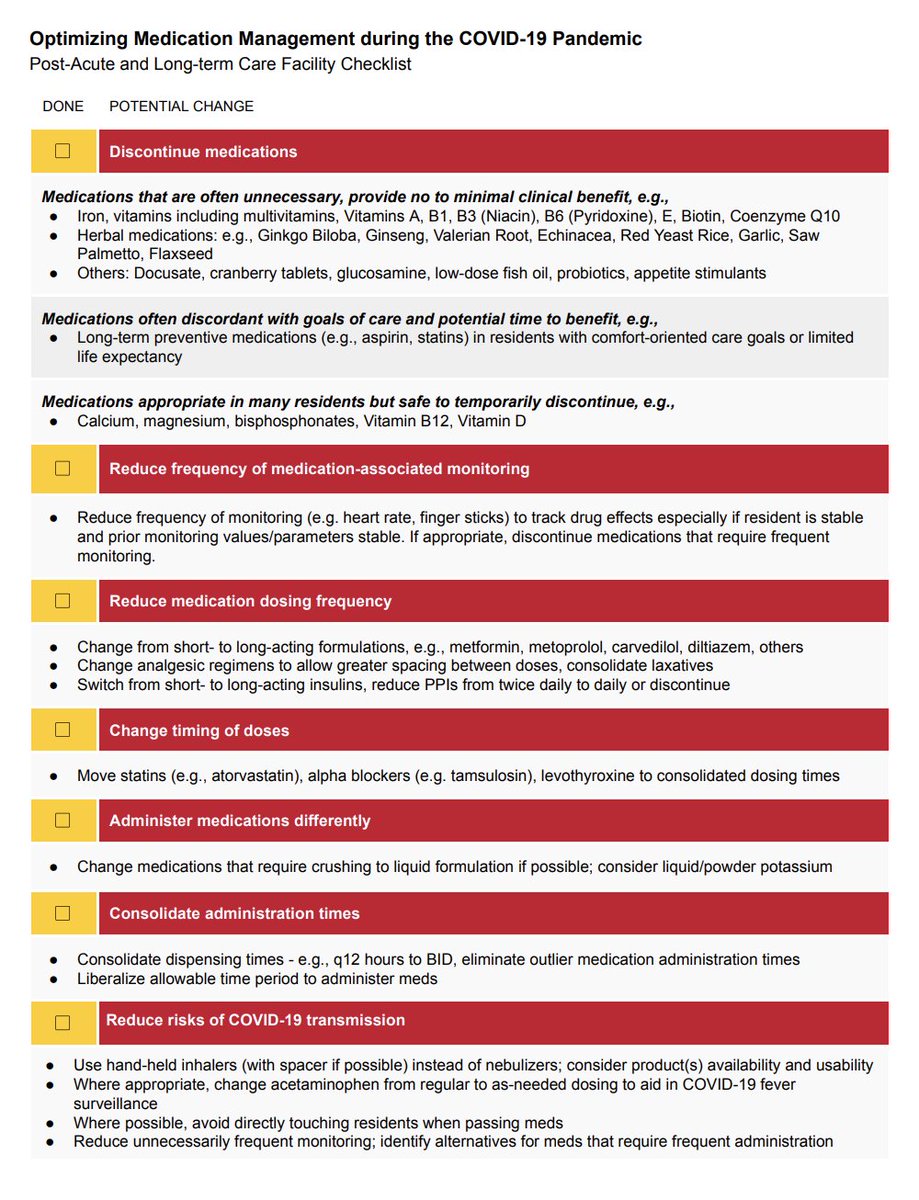Task force recommendations about managing meds in post-acute and long-term care during COVID-19. https://www.pharmacy.umaryland.edu/centers/lamy/optimizing-medication-management-during-covid19-pandemic/">https://www.pharmacy.umaryland.edu/centers/l...
Summary of recommendations in thread below:
/1
Summary of recommendations in thread below:
/1
Discontinue or reduce meds that are
- Unnecessary or ineffective (e.g., vitamins, herbals, docusate), or
- Inconsistent with goals of care or limited life expectancy (e.g., statins), or
- Safe to TEMPORARILY d/c even if indicated long-term (e.g., bisphosphonates, calcium)
/2
- Unnecessary or ineffective (e.g., vitamins, herbals, docusate), or
- Inconsistent with goals of care or limited life expectancy (e.g., statins), or
- Safe to TEMPORARILY d/c even if indicated long-term (e.g., bisphosphonates, calcium)
/2
Reduce frequency of medication-associated monitoring
- When such monitoring goes beyond clinical need (e.g., BP checks prior to administering routine BP meds)
- If appropriate, d/c meds that need frequent monitoring (e.g., short-acting insulins)
/3
- When such monitoring goes beyond clinical need (e.g., BP checks prior to administering routine BP meds)
- If appropriate, d/c meds that need frequent monitoring (e.g., short-acting insulins)
/3
Reduce dosing frequency
- Change from short- to longer-acting meds (e.g., carvedilol CR)
- Change analgesic regimens to reduce dose frequency, if possible
- Switch from short- to longer-acting insulins; change PPIs from BID to QD or d/c entirely
/4
- Change from short- to longer-acting meds (e.g., carvedilol CR)
- Change analgesic regimens to reduce dose frequency, if possible
- Switch from short- to longer-acting insulins; change PPIs from BID to QD or d/c entirely
/4
Move statins, alpha blockers, levothyroxine to consolidated dosing times (e.g., AM dosing)
Change meds that require crushing to liquid formulation
/5
Change meds that require crushing to liquid formulation
/5
Consolidate dispensing times (e.g., q12 hour to BID) where clinically appropriate, eliminate outlier med dispensing times
Liberalize allowable period for nurses to pass meds
/6
Liberalize allowable period for nurses to pass meds
/6
Reduce risks of COVID-19 transmission by
- Use hand-held inhalers instead of nebs, where possible. If switch to MDIs, use spacers.
- Consider change acetaminophen from regular scheduled dosing to as-needed dosing, to aid COVID fever surveillance
/7
- Use hand-held inhalers instead of nebs, where possible. If switch to MDIs, use spacers.
- Consider change acetaminophen from regular scheduled dosing to as-needed dosing, to aid COVID fever surveillance
/7
Reduce risks of COVID-19 transmission by
- Where possible, avoid directly touching residents during med passes
- Reduce unnecessarily frequent monitoring related to meds (does not apply to COVID-related monitoring)
/8
- Where possible, avoid directly touching residents during med passes
- Reduce unnecessarily frequent monitoring related to meds (does not apply to COVID-related monitoring)
/8
Goal of these recommendations is to reduce unnecessary, harmful, and burdensome med use, & streamline safe medication administration to reduce opportunities for COVID-19 transmission between staff & residents. Efficiencies also allow nurses to focus on other impt tasks.
/9
/9
Recommendations should be adapted for local situation and individual resident circumstances! But, useful to have a systematic approach to these challenging issues.
Check out the guide at https://www.pharmacy.umaryland.edu/centers/lamy/optimizing-medication-management-during-covid19-pandemic/
/end">https://www.pharmacy.umaryland.edu/centers/l...
Check out the guide at https://www.pharmacy.umaryland.edu/centers/lamy/optimizing-medication-management-during-covid19-pandemic/
/end">https://www.pharmacy.umaryland.edu/centers/l...

 Read on Twitter
Read on Twitter


